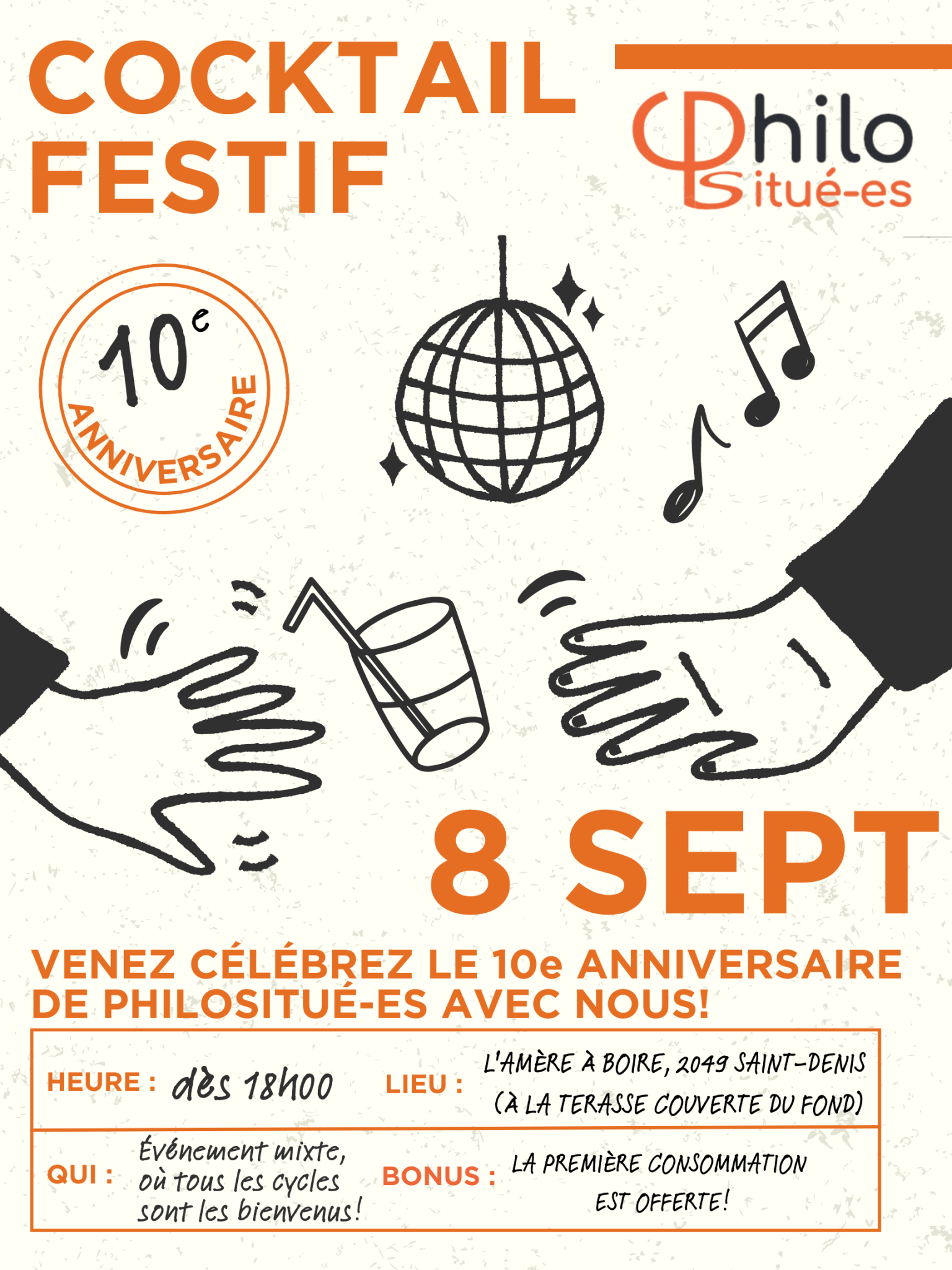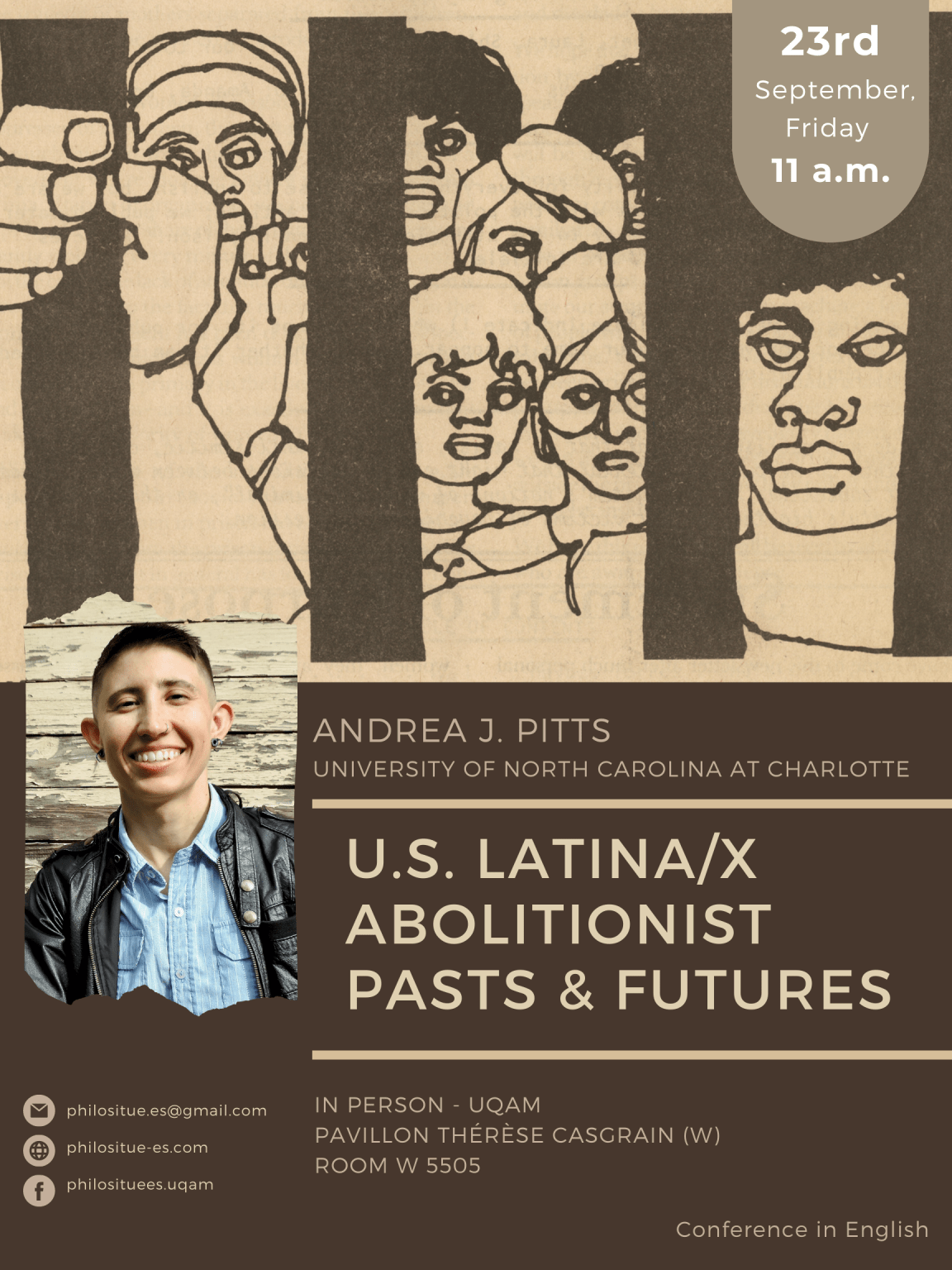
Cocktail festif pour le 10e ANNIVERSAIRE de PhiloSitué-es !

Cette année, PhiloSitué-es célèbre ses 10 années d'activité!
Afin de souligner les nombreux projets accomplis par notre organisation depuis une décennie déjà, vous êtes convié-es le 8 septembre à 18h à L'amère à boire.
Au programme : présentation de PhiloSitué-es pour mieux connaître son histoire et ses objectifs, discussions sur les événements futurs de l'organisation et, surtout, espace d'échange informel pour aborder l'enjeu de la diversité des perspectives en philosophie.
Cet événement mixte veut rassembler les étudiant-es de tous les cycles, de l'UQAM et d'autres universités, autour d'une cause commune : promouvoir la présence active des femmes et des personnes issues de minorités de genre et le rayonnement de leurs recherches en philosophie.
58e Conférence : SOPHIE BRETAGNOLLE (UQAM) - "Réconcilier science et politique : l’IPBES et les systèmes de connaissances locaux et autochtones"

Pour sa 58e conférence, PhiloSitué-es (anciennement « Fillosophie ») a le plaisir d’accueillir Sophie Bretagnolle, doctorante en philosophie à l'Université du Québec à Montréal (UQAM) pour une conférence intitulée
Réconcilier science et politique : l’IPBES et les systèmes de connaissances locaux et autochtones
La présentation aura lieu le vendredi 31 mars à 14 h, au local W-5215 de l’UQAM
(455 boulevard René Lévesque)
Fondée en 2012, l’Intergovernmental Science-Policy Platform on Biodiversity and Ecosystem Services (IPBES – La Plateforme Science-Politique Intergouvernementale sur la Biodiversité et les Services Écosystémiques) est un des plus importants regroupements scientifiques chargé de synthétiser les connaissances sur la biodiversité et les services écosystémiques à destination des décideurs politiques. Ainsi, les choix méthodologiques de l'IPBES sont susceptibles d'avoir des répercussions significatives à la fois sur la recherche scientifique, et sur la réception politique des recommandations formulées dans leurs rapports. Or, l’IPBES a développé une méthodologie singulière dans laquelle la question de l’inclusivité, notamment à l’égard des systèmes de connaissances locaux et autochtones, est centrale. Selon les membres de l’IPBES, la prise en compte de ces systèmes de connaissances locaux et autochtones aurait un rôle à la fois épistémologique, dans l’avancement des connaissances scientifiques, et un rôle politique, dans la légitimité politique qu’ils apporteraient aux recommandations scientifiques (Díaz et al., 2015, 2018). Cette décision est cependant jugée comme n’ayant pas de pertinence scientifique et comme risquant à l’inverse d’amoindrir la crédibilité scientifique et politique de l’IPBES (De Groot et al., 2018 ; Kenter, 2018 ; Braat, 2018 ; Masood, 2018).
Sophie Bretagnolle est au doctorat en philosophie de l’écologie sous la direction d'Anouk Barberousse (Sorbonne Université) et de Christophe Malaterre (UQAM). Sa thèse porte sur le concept de Service Écosystémique et cherche à identifier comment ce concept est mobilisé par la communauté scientifique pour répondre aux défis de l'érosion de la biodiversité. Ses recherches mobilisent des éléments de philosophie des sciences et de philosophie politique pour alimenter ses analyses épistémologiques et explorer les interactions entre science et société.
Dernièrement, Sophie a présenté ses recherches sur les réticences d’une partie de la communauté scientifique à prendre en compte des critiques politiques dans leurs travaux scientifiques ainsi que sur les liens entre les concepts de service écosystémique, écosystèmes et contributions de la nature pour les humain·es.
La conférence est gratuite et se déroulera en français.
57e Conférence : ARINA PISMENNY (University of Florida) - "Pansexuality: A Closer Look at Sexual Orientation"

Pour sa 57e conférence, PhiloSitué-es (anciennement « Fillosophie ») a le plaisir d’accueillir Arina Pismenny (University of Florida) pour une conférence intitulée
Pansexuality: A Closer Look at Sexual Orientation
La présentation aura lieu le vendredi 25 novembre à 14 h, au local W-5215 de l’UQAM
(455 boulevard René Lévesque).
What is ‘sexual orientation’ for?’ is a question we need to answer when addressing a more seemingly basic one, ‘what is sexual orientation?’. The concept of sexual orientation is grounded in the concepts of sex and/or gender since it refers to the sex or gender of the individuals one is sexually attracted to. Typical categories of sexual orientation such as ’heterosexual’, ‘homosexual’, and ‘bisexual’ all rely on a sex or gender binary. Yet, it is now common practice to recognize sex and gender categories that transcend these binaries. Should our sexual orientation categories be revised to reflect sex and gender diversity? If so, how? Drawing on the example of pansexuality, I argue that they should. The reason is that because the point of reconstructing the concept of sexual orientation should be political: it should make it easier to argue for the protection of those who have been marginalized or discriminated against because their sexual attraction is other than heterosexual.
As a first concrete example, I will introduce you on how my research topic ‘Politics of Mathematics’ became an interesting background knowledge to apply to the support of young researchers in offering a variety of scientific methods.
As a second example of dealing with diversity and offering good practices for education and training I will introduce my fascination and my research on ethnomathematics.
This takes me to the core topic of my current research ‘Woke mathematics’ or how to deal with diversity in mathematics education.
Arina Pismenny is Assistant Instructional Professor in Philosophy. She earned her Ph.D. from City University of New York, The Graduate Center. Her research is primarily in moral psychology, ethics, and philosophy of sex and gender. Her recent projects include elucidating the relationship between romantic love and morality, analyzing the political and ontological dimensions of sex and sexual identities, and explaining the ways in which emotions can contribute to injustice. Arina Pismeny is author of The Moral Psychology of Love, co-edited with Berit Brogaard as part of the Moral Psychology of Emotions series by Mark Alfano, Lanham, MD: Rowman & Littlefield in 2022.
La conférence est gratuite et se déroulera en anglais.
56e Conférence : KAREN FRANÇOIS (Vrije Universiteit Brussel) - "Culture of Science"

Pour sa 56e conférence, PhiloSitué-es (anciennement « Fillosophie ») a le plaisir d’accueillir Karen François (Vrije Universiteit Brussel) pour une conférence intitulée
Cultures of Science
La présentation aura lieu le vendredi, 7 octobre à 14 h, au local W-5215 de l’UQAM
(455 boulevard René Lévesque).
In this lecture I will start with an overview of my research career and my research output to take you to the topic of ‘Cultures of Science’ from my own perspective and my background in philosophy of science.
Central question I have to deal with, as a teacher in the Ba and Ma in Philosophy, and in managing support for young researchers (as the director of the doctoral training), is “How to deal with diversity”.
As a first concrete example, I will introduce you on how my research topic ‘Politics of Mathematics’ became an interesting background knowledge to apply to the support of young researchers in offering a variety of scientific methods.
As a second example of dealing with diversity and offering good practices for education and training I will introduce my fascination and my research on ethnomathematics.
This takes me to the core topic of my current research ‘Woke mathematics’ or how to deal with diversity in mathematics education.
Karen François is a professor of philosophy at the Vrije Universiteit Brussel (VUB) and the director of the Centre of Logic and Philosophy of Science (VUB).
She is a philosopher of science, studying the role of mathematics and of statistics in society, related to cultures and education. She is teaching philosophy of science (with an emphasis on bias in science e.g. gender, culture, ethics, integrity,…), ontology, history of mathematical practices, phenomenology, ethics and integrity.
Karen François is the director of the Doctoral School of Human Sciences (VUB) and is co-founder of the Flanders interuniversity network on doctoral education FLAMES (Flanders Network for Methodology and Statistics) supporting PhD candidates with a diverse offer of seminars in methodology. She is member of the international group PRIDE – PRofessionals In Doctoral Education and one of the co-authors of De Grande, H., Den Haese, J. & Francois, K. (2016).
Understanding the role of professionals: an HR perspective. In Zinner, L. (ed.). Professionals in doctoral education (pp. 35-62). Vienna: University of Vienna - Resch Druck
La conférence est gratuite et se déroulera en anglais.
55e Conférence : Andrea J. PITTS (University of North Carolina at Charlotte) - "U.S. Latina/x Abolitionist Pasts & Futures"

In this presentation, Andrea J. Pitts turns to sources from the history of U.S. Latina political activism to develop a framing of prison abolitionism from within these feminist trajectories. In particular, Pitts examines archival sources that demonstrate Mexican American women's involvement in prisoners' rights organizing during the 1970s and 1980s, with such work reconfiguring the activist and scholarly contributions of Latina/x and Chicana/x feminist philosophers such as María Lugones and Gloria Anzaldúa.
Biographie
Andrea Pitts (they/them/elle) est professeur de philosophie à l'Université de Caroline du Nord à Charlotte et elle est affiliée au département des Études Africaines, au Centre d'études sur l'holocauste, le génocide et les droits de l'homme, au programme d'études Latino-américaines, à l'école de Science des Données, Aspets sociaux d'initiatives de la santé (Social Aspects of Health Initiative) et au programme d'études sur les Femmes et le Genre.
Ses recherches portent sur la philosophie latino-américaine et la philosophie U.S. latinx, la philosophie critique de la race, la philosophie féministe, les études sur le handicap et les études critiques sur les prisons.
Elle a enseigné des cours de premier et de deuxième cycle sur des sujets tels que la philosophie féministe latina/x, les études sur la migration queer, l'abolitionnisme des prisons, la politique transgenre critique et l'épistémologie féministe.
Andrea Pitts est l'auteur de Nos/Otras : Gloria E. Anzaldúa, Multiplicitous Agency, and Resistance (2021), et co-éditrice avec Mark Westmoreland de Beyond Bergson : Examining Race and Colonialism through the Writings of Henri Bergson (2019) et Theories of the Flesh : Latinx and Latin American Feminisms, Transformation, and Resistance avec Mariana Ortega et José M. Medina (2020).
Plusieurs de ces publications paraissent dans The Journal of Philosophy of Disability, Hypatia, IJFAB : International Journal of Feminist Approaches to Bioethics, Radical Philosophy Review, Disability and American Philosophies, Decolonizing American Philosophy, Inter-American Journal of Philosophy et Comparative Studies in Asian and Latin American Philosophies.
Enfin, Andrea Pitts co-organise, avec Perry Zurn, le Trans Philosophy Project, une initiative professionnelle et de recherche dédiée au soutien des philosophes trans, non binaires et de genre différent.
Voici un article supplémentaire en libre accès : Andrea Pitts. 2019. “‘The Atlas of Our Skin and Bone and Blood’: Disability, Ablenationalism, and the War on Drugs.” Genealogy 3 (4): 1-16.